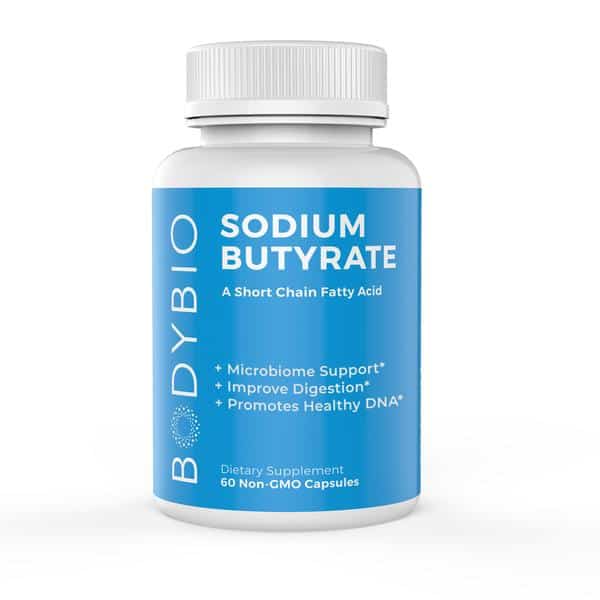Druggenius.com is reader-supported. We may earn a commission through products purchased using links on this page. Learn more about our editorial process here.
What foods have butyrate? Butyrate (also known as butyrate acid or butanoic acid) is a short-chain fatty acid made by health-promoting gut bacteria in most bioliquids and tissues. It has some mighty powerful effects on the human gut and wider health. So much so that some even call it the gut’s superpower.
Butyrate functions as an HDAC inhibitor (Histone deacetylase), a relatively new class of anti-cancer and anti-inflammatory agents that play important roles in suppressing the activity of specific immune cells and regulation of epigenetic/non-epigenetic mechanisms, inducing death, apoptosis, and cell cycle arrest in cancer cells. These functions are believed to contribute to its role in preventing colorectal cancer and inflammation.
Researchers are also looking further into the possibility of butyrate as a component in achieving good, quality sleep. Butyrate binds to receptors located on the liver wall or portal vein. If that’s the case, the more butyrate in the body, the more it could possibly ensure a more comfortable, good night’s rest.
While the gut can naturally produce its own butyrate, adding specific foods could further help boost its production levels. Many studies show that foods rich in fiber are ideal for this since the gut ferments and digests them.
What Foods Have Butyrate?
Whole Grains

Whole grains are an excellent source of fiber, which can help boost the gut’s butyrate levels. In addition, they are also great sources of iron and magnesium, which makes them good for improving one’s cholesterol levels, and even lowering the risk of getting heart disease.
Since whole grains contain all parts of the original grain kernel like the bran, endosperm, and the germ, they are thought to be higher in nutrients than refined ones. As a result, they still retain dietary fiber, iron, and many B vitamins.
The following are examples of whole grains:
- Oatmeal
- Rye
- Barley
- Brown rice
- Popcorn
- Bulgur
- Buckwheat
- Millet
- Cereals
- Whole-wheat bread, pasta, and crackers
Legumes

The legume family has always been considered a food group integral in promoting overall health due to its numerous health benefits.
As we know, these consist of
- Beans
- Peas
- Soybeans
- Green peas
Aside from increasing butyrate levels in the body, black beans’ various qualities and benefits are worth mentioning here. One study found that eating cooked black beans effectively improved insulin sensitivity and decreased inflammatory response. The same study also found that black beans helped improve glucose response, which was made possible by modifying the gut microbiota. With all of those things considered, that makes it a worthy addition to your butyrate-rich diet plan.
Fruits and Vegetables

Being the healthiest of all food groups, it’s not surprising that fruits and vegetables are rich in fiber, but some of them have higher amounts of fiber than others.
Fruits high in fiber include (measured by fiber per cup)
- Strawberries: (3 grams)
- Apples: (3 grams)
- Pears: (4 grams)
- Blueberries: (4 grams)
- Kiwifruit: (5 grams)
- Raspberries: (6.4 grams)
- Pomegranate: (7 grams)
- Guavas: (9 grams)
- Avocados: (13 grams)
- Passion fruit: (24.5 grams)
As for fiber-rich vegetables (also measured by fiber per cup)
- Okra (4 grams)
- Spinach (4 grams)
- Broccoli: (5 grams)
- Carrots: (5 grams)
- Kale (5 grams)
- Turnip greens: (5 grams)
- Parsnips (7 grams)
- Artichokes (8 grams)
- Collard greens (8 grams)
- Green peas: (9 grams)
Other worthy mentions include brussels sprouts, rutabagas, asparagus, mangoes, cherries, and bananas.
Full-Fat Dairy

Eating a high-fat dairy diet is a good way to get your butyrate levels going up since dairy contains butyric acidâthe best examples of these you can find in your very own fridges and kitchen cupboards.
- Parmesan cheese
- Milk
- Yogurt
- Butter
Don’t go chowing down on all of that just yet. It’s important to note that while full-fat dairy helps boost the butyrate levels in the gut, eating or drinking too much of them can be bad for the health since they’re still considered high in saturated fat and cholesterol. Doctors and nutritionists recommend a maximum of up to 3 servings per day for adults, while children should have a limit of two servings daily.
Butyrate Food Supplements
Aside from eating a butyrate-rich diet, you can also take butyrate supplements to help boost its production levels in the gut when eating alone doesn’t bring its desired effects. A study found its potential benefits of taking these supplements in treating conditions like gout, diabetes, or atherosclerosis, which are metabolic disorders where inflammations most likely occur. Apart from that, it has also shown promise in causing a healthy gut inflammation response, improving gut integrity, and inhibiting HDAC.

You are what you eat
The adage “you are what you eat” definitely rings true. What we eat and drink can make or break the better, healthier versions of ourselves, so it’s important to stick to healthy, nutritious diets, especially if we’re aiming to improve certain aspects of our body.
Going for a butyrate-food diet is a recommendable and wise step that will surely reap numerous health benefits not only for your gut health but also for the rest of the body.
But before trying out such foods, it pays to check whether or not these truly suit your health needs, since certain foods can sometimes yield adverse effects like allergies and the sort, so don’t forget to ask your trusted dietitian or doctor for tips about healthy eating, diet plans, and how to make them a success.
Similar Articles
How To Naturally Increase Serotonin
Disclaimer: this article does not constitute or replace medical advice. If you have an emergency or a serious medical question, please contact a medical professional or call 911 immediately. To see our full medical disclaimer, visit our Terms of Use page.










